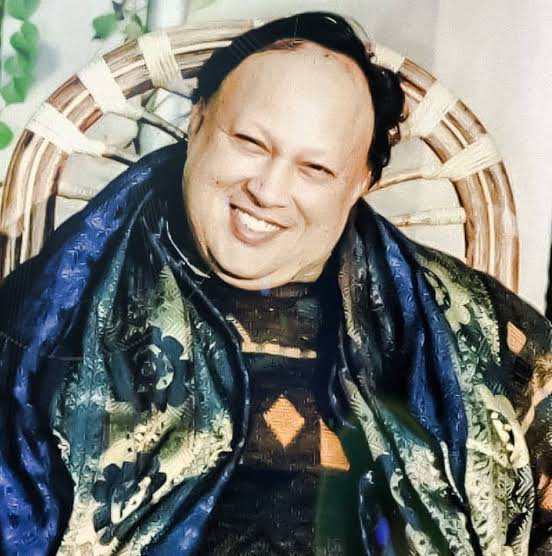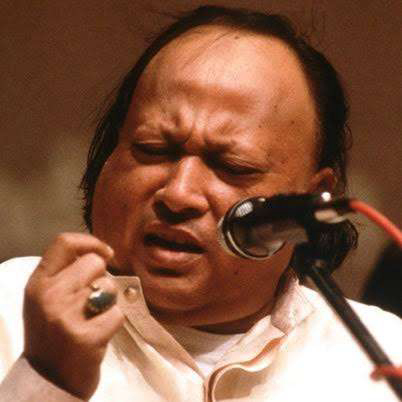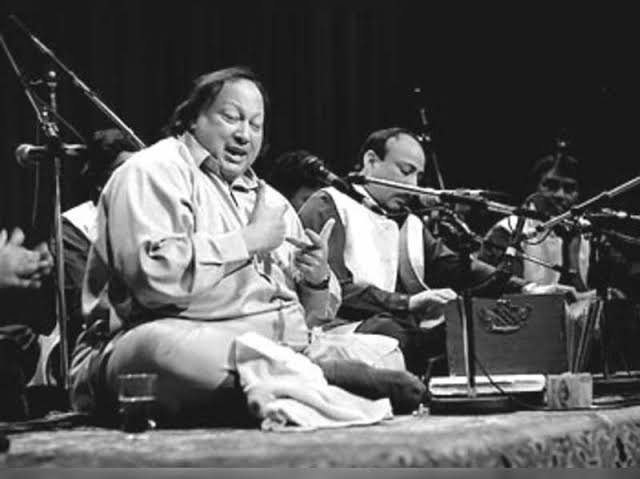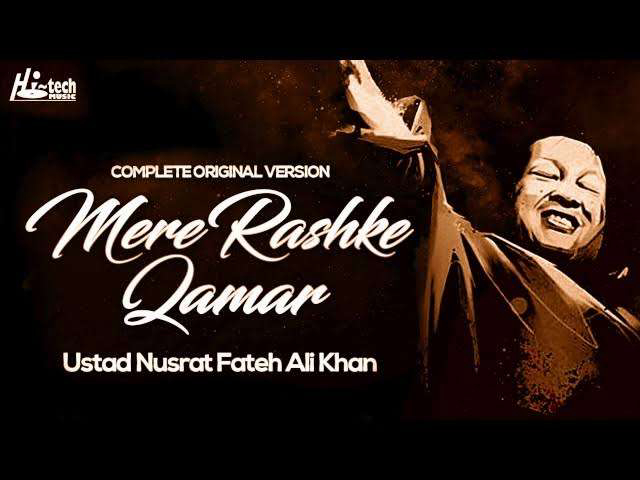
Woh bhi apne na hue,
Dil bhi gaya haatho se,Aise aane se toh behtar tha,Na aana aapka
It’s the 23th death anniversary of king of qawwali popularly known as Nusrat Fateh Ali Khan. He was born on 13 October 1948 and died on 16 August 1997 in a hospital of London. He died due to cardiac attack at the age of 49. He was born in Faisalabad, Punjab province of Pakistan. He belonged to the Patiala gharana extending the 600 years old qawwali traditions of his family.
Inspired from his singing Ghulam Ghaus Samdani changed his name to Nusrat Fateh Ali Khan from Pervaiz. His fathers as well as his uncles Ustad Mubarak Ali Khan and Salamat Ali Khan were famous qawwals from this gharana. He was the first son and fifth child of Fateh Ali Khan. Initially his father didn’t want him to become a qawwali artist because according to him they had a low status. But he was a discerning person and exceptional interest in qawwali so his father relented. With that he loved eating mangoes in winter season, loved watching Hollywood movies and had problem in pronouncing the word ghar properly.
As he started learning his father died in 1964 leaving his musical education under the supervision of his uncles. And in 1971, he officially became the leader of the qawwali family after the death of uncle Mubarak Ali Khan. His first public performance was at the age of 15 at his father’s chelum. And his 1st musical performance as a leader was a recording broadcast for the annual Radio Pakistan music festival known as Jashn-e- Bharan. He mainly sang in Urdu and Punjabi and occasionally in Persian, Braj Bhasha and Hindi. Haq Ali Ali was his first major hit song in Pakistan which was performed in a traditional way.

In 1985 Khan performed at the World of Music, Arts and Dance festival in London. And the journey of performing internationally continued from Paris to Japan to New York and many others. During his 25 years of long musical career he received many honors, nominated as well as awarded for his many albums. In 1987, he received the President of Pakistan’s Award for Pride of Performance. He has also received the UNESCO Music Prize and Grand Prix des Ameriques. He has also received Arts and Culture Prize of Fukuoka Asian Culture Prizes.

In 1992 a book was published in Japan called as Emperor Qawwali which gave him the title of “Singing Buddha”. “Voice of Pradise”in USA, “Pavarotti of East” in France. The legacy of singing Buddha was always enchanting and mesmerizing to listen. He toured extensively, performing in over 40 countries including US, Europe East Asia and Middle Eastern countries. He was also given the title of Ustad (the master) after performing classical music at a function in Lahore on the anniversary of his father’s death.
He had collaboration with many international artists and one of the famous collaboration came in 1995 in the Dead Man Walking with two of his songs. He contributed and performed in several Pakistani films. He composed music for three Bollywood films, which includes the film Aur Pyaar Ho Gaya, in which he also sang for "Koi Jaane Koi Na Jaane", and "Zindagi Jhoom Kar". He also composed music for Kartoos, where he sang for "Ishq Da Rutba", and "Bahaa Na Aansoo", alongside Udit Narayan.
Acchi soorat ko sawarne ki zaroorat kya hai,
Saadagi me bhi qayamat ki ada hoti hai
Khan is credited as one of the most progenitors of "world music". A Seno of Asia week magazine wrote that, His powerful vocal presentations, which could last up to 10 hours, brought forth a craze for his music all over Europe. Many artists like A.R Rahman, Naida Ali, Zayn Malik, Javed Akhtar etc citied him as an influence. His work was favorite among socialites, actors and singers.
Many international tributes are still being given in his name. In 2015 on his 67th birthday Google gave tribute to him by calling him a person who opened world’s ears to the rich, hypnotic sounds of the Sufis. His some famous qawwali are recreated by the bollywood music industry and audience is in love with it.
- Ye Jo Halka Halka Suroor Hai - featuring Aishwarya Rai Bachchan and Rajkumar Rao.
- Mera Piya Ghar Aaya – featuring Madhiuri Dixit
- Sanu Ik Pal Chain Na Aave - Ajay Devgn and Ileana D’cruz’s movie ‘Raid’.
- Mere Rashke Qamar -for the movie ‘Baadshaho’

In a conversation with one of the media organizations Nusrat Fateh Ali Khan’s nephew Muhammad Ali Sheikhu expressing similar feelings, he said, “Really 23 years?” no every day, every minute and every second one of his fans is listening to him, the legend never dies. Because of them, our family is known around the globe. Even now when someone listens to his songs has a magical feeling.
He may have left the world but he is still with us through his Qawwalis.
